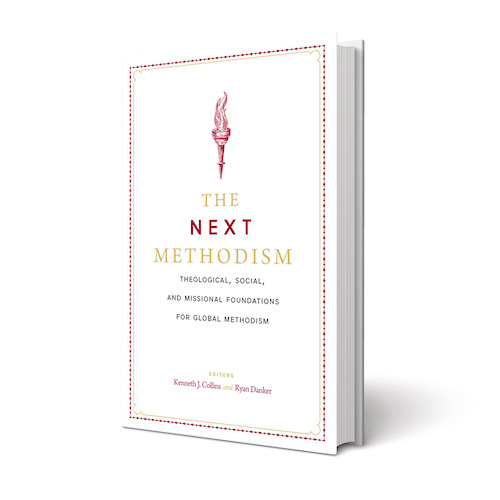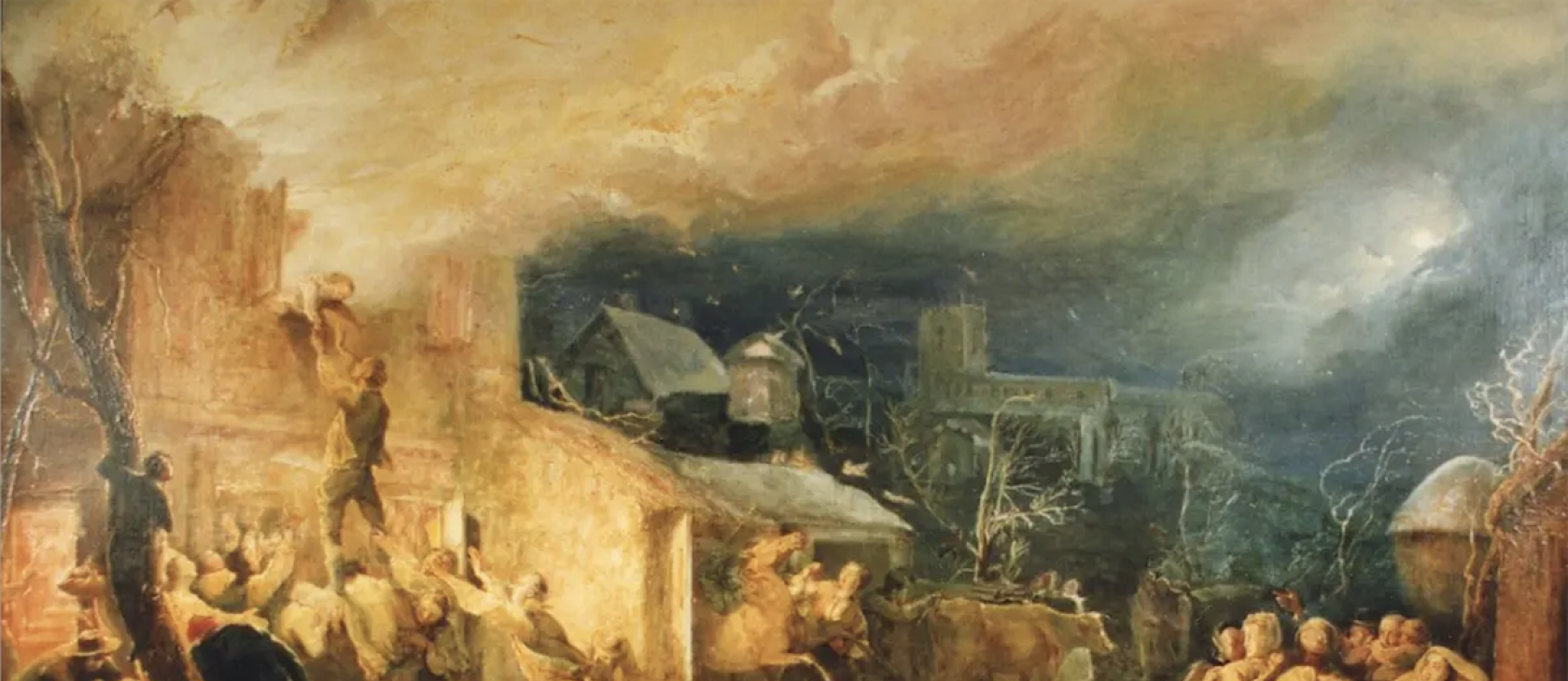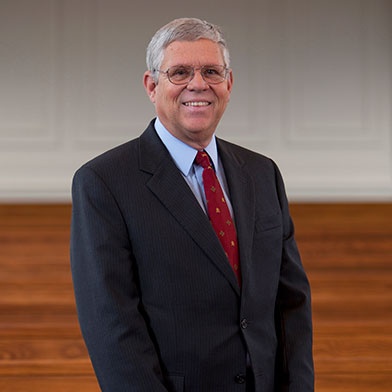In his famous poem “The Second Coming,” W.B. Yeats warns about what happens when a society, or in our case a church, descends into anarchy and lawlessness:
Turning and turning in the widening gyre
The falcon cannot hear the falconer;
Things fall apart; the centre cannot hold;
Mere anarchy is loosed upon the world,
The blood-dimmed tide is loosed, and everywhere
The ceremony of innocence is drowned;
The best lack all conviction, while the worst
Are full of passionate intensity.
As the United Methodist Church fractures, the future for more traditional Methodist congregations will depend on its ability to wed biblical, Wesleyan, and disciplinary principles into a coherent whole as overseen by faithful bishops. There is still much work to be done.

Edited by Kenneth J. Collins and Ryan N. Danker
(Seedbed, 2022)
Since well before the beginning of the pandemic in 2020, there have been seismic tremors that something big was about to happen to the largest Methodist denomination in the world, The United Methodist Church (UMC), and it was not going to be pretty. Some began to talk quietly and angrily about schism, but the term schism hardly seemed appropriate. A particular Protestant denomination does not constitute the “catholic church, apostolic and universal” but rather one minority subsection of the universal church. When individuals or churches change affiliation from one Christian denomination to another, this is merely an example of sheep shift, not schism, especially when those individuals and/or churches have not been unfaithful to the biblical witness about marriage, sexuality, and ordination, or to the creeds and confessions of the universal church—or even to the United Methodist Book of Discipline’s standards on such matters.
What has happened is that the “centre” cannot hold in the UMC, and mere anarchy has been produced even by bishops who have violated the disciplinary standards in regard to marriage and ordination, with whole conferences refusing to abide by the rules about disciplining clergy who also are violating these standards—standards about sexual behavior and marriage that were once again reaffirmed at the special General Conference of 2019. And now the committee in charge of organizing General Conferences has declared that the next General Conference will be held in 2024. The Judicial Council will need to decide whether this will involve a whole new slate of delegates or the same ones elected for the postponed 2020 General Conference. Stay tuned.
The General Conference, typically a ceremony of innocence and cooperation and collegiality, even when there are differences of views, has been overwhelmed by the happenings of the past three years or so. There is nothing whatsoever Christian about acts of defiance of our moral standards. It is just further evidence that the covenant has been broken again and again by the progressives who bizarrely think they are standing on the higher moral ground in doing so. To all this I ask: What would Jesus, who declares in Matthew 19 that his standards for all his disciples are heterosexual monogamy in marriage or celibacy in singleness, say about all this? I suspect he would be profoundly ashamed of this United Methodist Church.
Were not the political maneuverings in pursuit of covenant-breaking depressing enough, most recently there was a “worship” service at Duke Divinity School where God, who is Spirit and not within the spectrum of human gender identity, was called The Holy and Queer One. I’m sure that Bishop Goodson, who ordained me and for whom that chapel is named, is rolling over in his grave, crying out “Blasphemy and idolatry!” Certainly for many thousands of us in worldwide Methodism, we are ready to say, “Enough with the church baptizing the current ‘woke’ cultural trends and calling them good, much less godly.” John Wesley, the man who wrote “Thoughts upon Celibacy,” which is the behavior he expected of all Methodists outside the context of heterosexual monogamy, is doubtless deeply disappointed in what has been happening in the UMC.
In the wake of all this came the pronouncement that the Global Methodist Church had officially launched on May 1 of this year, and not surprisingly a large collection of essays has appeared in preparation for what’s next, appropriately entitled The Next Methodism: Theological, Social, and Missional Foundations for Global Methodism. The volume is primarily aspirational in character, reflecting what various prominent scholars, pastors, and laypersons hope will be the more biblical and Wesleyan character of Global Methodism going forward. Of course the question to be asked is: Who’s going to decide how and whether these various hopes and dreams are actually implemented in the new Methodist Church being formed? Inquiring minds want to know, especially since there are already a variety of opinions on the crucial practical issues.
Like any collection of essays, some in The Next Methodism are more salient and on target than others, but all of them appear to share a deep concern that the UMC has gone badly astray in regard to appropriate human sexual expression, marriage, and ordination. The hope shared is that, in these matters and many others, the Global Methodist Church, or at least some future form of the UMC, will be an example of a genuinely more biblical and Wesleyan approach to Methodism.
In what follows, I want to highlight some of the more telling points brought forward in this volume, noting the broad spectrum represented of the orthodox, traditionalists, and evangelicals in the UMC—men and women, African and Asian and Caucasian, laity and clergy (including some bishops). None of these otherwise diverse group of essays were written by any of the main leaders of the Good News movement within the UMC, which represents the more “conservative” faction within the denomination. No, this volume represents a much broader spectrum of Methodists, and that is a good thing.
The scope of articles is impressive—ranging from how Methodists should approach and use the Bible and better appropriate our Wesleyan theology and ethics, to a vision of evangelism and missions in the “Next Methodism,” dealing with besetting sins such as racism and sexism, embracing the spiritual gifts the Bible mentions, and so much more. The 35 articles are all clearly written and succinct, most being about 10 pages in length. It is must reading for those who care about the future of Methodism both in the U.S. and worldwide.
In this present climate two of the more important essays are those by Timothy Tennent on having a proper theology of the body, not a gnostic one (i.e., when it comes to one’s gender identity, the X and Y chromosomes do not lie and the body provides a crucial part of our identity now and in eternity), and James Thobaben on “The Sexual Ethics of the Body of Christ” (critiquing “the non-scientific assertion that mammals [including humans] do not have intrinsic sexuality” and the denial of “the biological reality of primates having two sexes”).
While there are very fine essays by Joel Green and David Watson on a proper approach to the Bible and its teaching and preaching in Methodism, honestly we could have used many more of that sort and fewer on the history of Methodism. After all, it is the Bible, as Wesley said, we should be preaching, not our church history. As for the sacraments, both baptism and the Lord’s Supper should focus on the death of Christ on the cross (see Rom. 6 and 1 Cor. 11), not later theologies of grace or renewal or making a good confession when one comes of age. As sociologists have long stressed, the central rituals of a religious group reflect the most crucial theological foci of that group—in this case, union and communion with Christ. Methodists need a much better grounding in the meaning of the atoning death of Christ as a ransom for the many, and in what St. Paul means when he describes the death and burial of the old sinful self as when one is buried with Christ in baptism. But for that theological awakening to transpire, one would first have to believe in the lostness and sinfulness of humankind and the need for actual redemption, not mere consciousness raising. In short, a theology of creation and redemption without a theology of human fallenness and sin and their effects even on our physical bodies is a nonstarter if Methodist renewal is going to happen. One cannot simply assume “If I was born with these inclinations and desires, therefore they must be good, and therefore they must be from God.” Not according to either the Bible or Wesleyan theology.
A few highlights of this book are worth stressing. For example, Billy Abraham writes, “The most striking feature of the proposed doctrinal commitments of the Global Methodist Church is the addition of the great creeds of the church.” Under the heading the “Problem of Love Apart from Holiness,” Ken Collins reminds us that “when much of the vocabulary of the church has been redefined in terms of powerful social, cultural, and political currents then this is solid evidence that the regrettable event of narrative displacement has indeed occurred.” In his critique of modern assumptions, Bill Arnold stresses that the greatest lie of modernity is that we are “Homo autonomous, the self-sufficient, self-ruling, and autonomous human beings who are capable of controlling our own destiny.… Our world around us believes there is no higher virtue, no greater attribute than the radically free and independent, self-reliant, and self-sufficient human being.” This is coupled with the lie “that the Holy Spirit of God directs society gradually—progressively—into ethical convictions that contradict and overturn former truths taught in the Bible. Yet the Holy Spirit always and everywhere comes to make people holy.” Suzanne Nicholson quotes Kenda Creasy Dean, who notes that many American teens have replaced orthodox theology with the oft-cited “moralist therapeutic deism,” a belief in a god who wants people to be nice to each other and live a happy life. “This adherence to a do-good, feel-good spirituality … has little to do with the Triune God of Christian tradition and even less with loving Jesus enough to follow him into the world.” And L. Fitzgerald Lovett stresses, “When it comes to racism, the church must be pro-active, or anti-racist.”
It is important and telling that the quote that comes up the most in these various essays is the famous remarks about John Wesley’s fear that, while Methodism will not cease to exist, it could well become a dead sect if it does not hold fast to the biblical doctrine, spirit, and discipline that characterized the beginning of the Methodist movement. And in fact, that is exactly what has happened. The UMC has been losing members in the 21st century faster than the speed of light. And no, this is not mainly because the recent pandemic has kept people away from in-person church attendance. It is because the United Methodist Church has too often not been faithful to its biblical, Wesleyan, and disciplinary foundations.
The United Methodist Church has too often not been faithful to its biblical, Wesleyan, and disciplinary foundations.
Let’s be clear. This volume is not written by a bunch of traditionalists fervently praying that next year will be 1950 all over again. As Bishop Lowry says in his helpful essay: “‘When the horse is dead, dismount.’ Neither a bygone past nor a fantasized social justice utopia can slake the deep hunger of a spiritually impoverished society.” No, The Next Methodism is very much forward-looking and well grounded in our biblical, apostolic, and Wesleyan faith.
To its credit, this collection of essays is not naive about the difficulties and long-term nature of giving birth to a “next Methodism” that is more biblical, Wesleyan, and disciplined than the current UMC. As David Thomas points out: “We will need a multigenerational mindset in thinking about the next Methodism, a long-term vision of the downstream benefits we hope our children and their children will benefit from. The challenge in that, though, is to match patience with urgency, marathon mentality with sprint intensity.” Just so, and as John the elder once said (1 John 3:2–3): “Beloved, we are now children of God, and what we will be has not yet been revealed. But we know that when Christ appears, we will be like Him, for we will see Him as He is. And everyone who has this hope in Him purifies himself, just as Christ is pure” (emphasis added).
But who will mind the store? As Bishop Whitaker writes: “Superintendency is essential in Methodism because of the character of Methodism as a disciplined community in which all members are accountable to one another, and there must be someone who watches over the whole. The question for future global Methodism is whether its superintendency should take the form of episcopacy.” My answer to this question is yes, for several reasons: (1) There is a biblical basis for having episkopoi or overseers who are not local church pastors or even district superintendents. (2) Protestantism has famously and rightly been accused of having a weak ecclesiology, as evidenced by the hundreds of Protestant denominations, compared for example to the Roman Catholic Church, and so a strong episcopacy is all the more urgent for the founding of a Global Methodist Church. (3) From the late 18th and well into the 19th century, when Methodism’s amazing growth in some years outpaced even actual population growth, the church had a strong episcopacy, with the bishop having the authority and power not only to make appointments but also to shape ministerial training, ensure that doctrines and disciplines of the church were maintained by its local ministers, and much more.
The unique genius of Methodism’s structure is its connectional system, which does not agree with the notion that the local church should be autonomous and that ministers should be subject to a local-church call system. This is because the local church is but part of a larger body of believers, all of whom need supervision by a working episcopacy, not least because a particular local church often does not have an objective perspective on its needs and what is best for it. The bishop must discern what is best for all the churches in a conference, not just a few or the most successful. But it is the conferences that debate and set the policy that the bishop is then required to implement, creating a balance between conciliar decisions and their implementation and supplementation by the bishops.
Perhaps the most important takeaway from a book like The Next Methodism is that, since the majority of Methodists are now found outside the American portion of the UMC, of necessity the Next Methodism, whether the Global Methodist Church or something else, will need to live the meaning of the word global, with global leadership, global structures, and global affirmation of doctrine, spirit, and discipline. It is a consummation devoutly to be wished.




